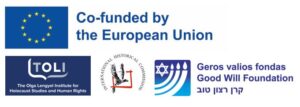The project Combating Holocaust Denial and Distortion through Active Citizenship, Remembrance and Education, co-funded by the European Union through the CERV programme is implemented in the period 1 March 2024 – 28 February 2026.
 The project aims to develop networks of educators and of young people who take action to remember the past in a dignified way, to prevent and combat Holocaust denial and distortion and to create frameworks for intercultural dialogue and active citizenship.
The project aims to develop networks of educators and of young people who take action to remember the past in a dignified way, to prevent and combat Holocaust denial and distortion and to create frameworks for intercultural dialogue and active citizenship.
A series of professional development opportunities will be offered to teachers in Croatia, Greece, Italy, Lithuania, Poland, Romania and Serbia. Between 30 and 35 teachers and other educational professionals will attend 4-day seminars in each of these countries. They will be supported to work with their students in order to carry out local history projects that involve a learning and research part and a part in which students share their newly gained knowledge, in creative ways, with wider audiences. The students will also learn how to identify manifestations of Holocaust denial and distortion online and to report them. They will share their experiences of online monitoring and of carrying out local history projects in an international conference. The students will form a European network of Young European Ambassadors for Remembrance and Active Citizenship.
The most active teachers in the network, along with other education professionals from the civic sector and public administration from ten countries, will be invited to attend an international conference in Lithuania. The experiences of working with students in an interdisciplinary approach, in order to learn about the Holocaust and promote human rights, will be shared at this conference. At this event, concrete steps will be discussed to consolidate and expand the European Network of Holocaust and Human Rights Educators and to create an impact that reaches policy makers.
Two publications will emerge from this project: a booklet with the students’ local projects that will inspire other young ambassadors to promote remembrance and act for democracy; and a resource guide for teachers focusing on women in the resistance.
The project partners are:
The project is co-funded by the European Union through CERV programme and by TOLI The Olga Lengyel Institute for Holocaust Studies and Human Rights. Also, the project is co-funded by The Goodwill Foundation (Lithuania).